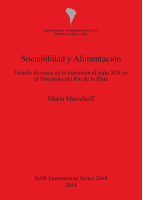Description
BOOK DESCRIPTIONThis book attempts to historize the construction of the dichotomy between public and private in Spanish colonial territories during the late 18th - early 19th centuries, when this opposition assumed some of the characteristics that today seem completely natural. It is usually acknowledged that these changes began at the level of everyday experiences that took place in a material world and while interacting with other people. Here we study these everyday experiences, particularly those structured around food habits within the domestic sphere in colonial non-elite domestic contexts. The first case study is the port of Buenos Aires while it was the head of the Viceroyalty of the Río de la Plata (1776-1810). Analysis of a sample of probate records each of them representing a single domestic unit. The second case study was the Nueva Colonia y Fuerte de Floridablanca, a small agricultural settlement in Patagonia (1780-1784). Here, several archaelogical lines of inquiry were followed: zooarchaeological, ceramic and glass remains and the analysis of architecture and spatial arrangement and distribution within four dwelling units excavated at the site. In every domestic context of both cases it could be observed that sociability affected the way food habitswere organized in different ways, but always re-enforcing domestic group identities. It could also be assessed that none of the identified ways of organizing food habits indicate that these colonial societies were on the margins of the novelties that took place in other contexts. On the contrary, having full knowledge of these tendencies, each domestic unit negotiated on a daily basis the way they ate, taking their own, very individual preferences, as the main rule.











